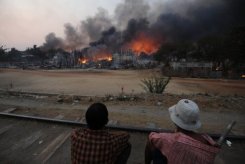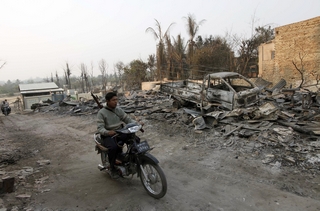By
JASON SZEP / REUTERS WRITER|
Saturday, March 30, 2013 |

Muslim
men pray at Meikhtila’s mosque in February. On March 20, riots would
destroy the building and thousands of Muslims would flee the town.
(Photo: Geoffrey Hiller)
SIT KWIN, PEGU DIVISION—The Muslims of Sit Kwin were always a small
group who numbered no more than 100 of the village’s 2,000 people. But
as sectarian violence led by Buddhist mobs spreads across central Burma,
they and many other Muslims are disappearing.
Their homes, shops and mosques destroyed, some end up in refugee
camps or hide in the homes of friends or relatives. Dozens have been
killed.
“We don’t know where they are,” says Aung Ko Myint, 24, a taxi driver
in Sit Kwin, a farming village where on Friday Buddhists ransacked a
store owned by the town’s last remaining Muslim. “He escaped this
morning just before the mob got here.”
Since 42 people were killed in violence that erupted in Meikhtila
town on March 20, unrest led by hardline Buddhists has spread to at
least 10 other towns and villages in central Burma, with the latest
incidents only about a two-hour drive from the commercial capital,
Rangoon.
The crowds are fired up by anti-Muslim rhetoric spread over the
Internet and by word of mouth from monks preaching a movement known as
“969″. The three numbers refer to various attributes of the Buddha, his
teachings and the monkhood. But it has come to represent a radical form
of anti-Islamic nationalism which urges Buddhists to boycott Muslim-run
shops and services.
Burma is predominantly Buddhist but about 5 percent of its 60 million
people are Muslims. There are large Muslim communities in Rangoon,
Mandalay and towns across Burma’s heartland where the religions have
co-existed for generations.
But as violence spreads from village to village, the unleashing of
ethnic hatred, suppressed during 49 years of military rule that ended in
March 2011, is challenging the reformist government of one of Asia’s
most ethnically diverse countries.
Dusk-to-dawn curfews are in effect in many areas of Pegu Division,
the region where Sit Kwin lies, while four townships in central Burma
are under a state of emergency imposed last week.
“I will not hesitate to use force as a last resort to protect the
lives and safeguard the property of the general public,” President Thein
Sein said in a nationally televised speech on Thursday, warning
“political opportunists and religious extremists” against instigating
further violence.
The unrest has made almost 13,000 people homeless, according to the
United Nations. State-run media reports 68 people have been arrested.
RUMOURS
The trouble in Sit Kwin began four days ago when people riding 30
motorbikes drove through town urging villagers to expel Muslim
residents, said witnesses. They then trashed a mosque and a row of
Muslim shops and houses.
“They came with anger that was born from rumours,” said one man who declined to be identified.
Further south, police in Letpadan have stepped up patrols in the
farming village of 22,000 people about 160 km (100 miles) from Rangoon.
Three monks led a 30-strong group towards a mosque on Friday. Police
dispersed the crowd, many of whom carried knives and staves, and briefly
detained two people. They were later released at the request of
township officials, police said.
“I won’t let it happen again,” said police commander Phone Myint.
“The president yesterday gave the police authority to control the
situation.”
The abbot who led the protest, Khamainda, said he took to the streets
after hearing rumors passed by other monks by telephone, about violence
between Buddhists and Muslims in other towns. He said he wanted revenge
against Muslims for the destruction by the Taliban of Buddhist statues
in Bamiyan province in Afghanistan in 2001.
“There is no problem with the way they live. But they are the
minority and we are the majority. And when the minority insults our
religion we get concerned,” he told Reuters. “We will come out again if
we get a chance.”
Letpadan villagers fear the tension will explode. “I’m sure they will
come back and destroy the mosque,” says Aung San Kyaw, 35, a Muslim.
“We’ve never experienced anything like this.”
Across the street, Hla Tan, a 67-year-old Buddhist, shares the fear.
“We have lived peacefully for years. Nothing can happen between us
unless outsiders come. But if they come, I know we can’t stop them,” he
said.
North of Sit Kwin, the farming town of Minhla endured about three hours of violence on both Wednesday and Thursday.
About 300 people, many from the nearby village of Ye Kyaw, gathered
on Wednesday afternoon. The crowd swelled to about 800 as townsfolk
joined, a Minhlapoliceman told Reuters. They then destroyed three
mosques and 17 shops and houses, he said. No Buddhist monks were
involved, said witnesses.
“VERY NERVOUS”
The mob carried sticks, metal pipes and hammers, said Hla Soe, 60, a
Buddhist who runs an electrical repair shop in Minhla. “No one could
stop them,” he said.
About 200 soldiers and police eventually intervened to restore a
fragile peace. “I’m very nervous that it will happen again,” he said.
About 500 of Minhla’s township’s 100,000 people are Muslims, said the
police officer, who estimated two-thirds of those Muslims had fled.
However, Tun Tun is staying. “I have no choice,” says the
26-year-old, whose tea shop was destroyed and looted by Buddhists, one
armed with a chainsaw.
He plans to rebuild his shop, whose daily income of 10,000 kyat ($11)
supports an extended family of 12. On the wall of his ransacked kitchen
is a portrait of democracy leader Aung San Suu Kyi. He did not believe
she could do anything to help.
Tun Tun traced the rising communal tension in Minhla to speeches
given on Feb. 26 and 27 by a celebrated monk visiting from Mon State, to
the east of Rangoon. He spoke to a crowd of 2,000 about the “969
movement”, said Win Myint, 59, who runs a Buddhist community centre
which hosted the monk.
After the 969 talks, Muslims were jeered and fewer Buddhists
frequented his tea shop, said Tun Tun. Stickers bearing pastel hues
overlaid with the numerals 969 appeared on non-Muslim street stalls
across Minhla.
President Thein Sein’s ambitious reform programme has won praise, but
his government has also been criticised for failing to stem violence
last year in Arakan State in western Burma, where officials say 110
people were killed and 120,000 were left homeless, most of them Rohingya
Muslims.
The UN special rapporteur on human rights in Burma said on Thursday
he had received reports of “state involvement” in the recent violence at
Meikhtila.
Soldiers and police sometimes stood by “while atrocities have been
committed before their very eyes, including by well-organized
ultra-nationalist Buddhist mobs”, said the rapporteur, Tomas Ojea
Quintana. “This may indicate direct involvement by some sections of the
state or implicit collusion and support for such actions.”
Ye Htut, a presidential spokesman and deputy minister of information,
called those accusations “groundless”. “In fact, the military and the
government could not be concerned more about this situation,” he said in
a Facebook post.
Late on Friday, three monks were preparing to give another “969″ speech in Ok Kan, a town 113 km (70 miles) from Rangoon.
credid-The Irrawaddy


 Buildings
burn around a mosque in riot-hit Meiktila, central Myanmar, on March
21, 2013. Two years after a repressive junta ceded power, Myanmar is
grappling with a surge in religious extremism that experts trace to
anti-Muslim "provocateurs" including radical Buddhist monks.
Buildings
burn around a mosque in riot-hit Meiktila, central Myanmar, on March
21, 2013. Two years after a repressive junta ceded power, Myanmar is
grappling with a surge in religious extremism that experts trace to
anti-Muslim "provocateurs" including radical Buddhist monks.
 A police officer rides a motorbike past debris of buildings and a
truck destroyed during ethnic unrest between Buddhists and Muslims in
Meikhtila, 550 kilometres north of Yangon, last Monday. (AP Photo)
A police officer rides a motorbike past debris of buildings and a
truck destroyed during ethnic unrest between Buddhists and Muslims in
Meikhtila, 550 kilometres north of Yangon, last Monday. (AP Photo)









































